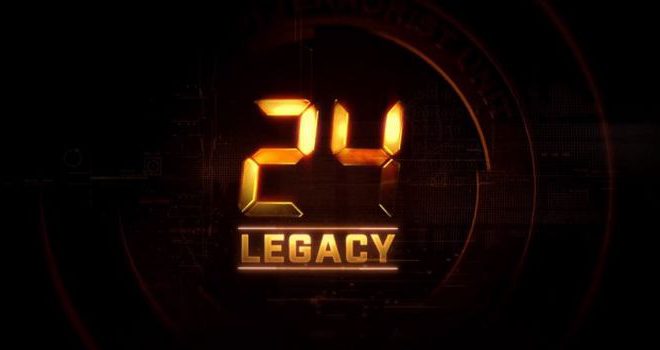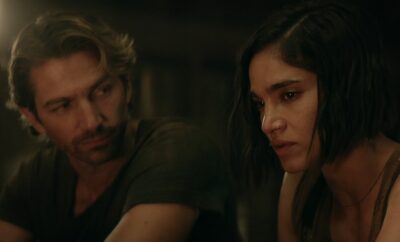
Interviews
Jimmy Smits – 24: Legacy
By: Lisa Steinberg
Q) I was trying to remember if you had worked before with Gerald McRaney.
Jimmy: No, we haven’t. I’m a huge fan, though. He’s my now major dad. He’s my major dad.
Q) So, did you guys have a lot of time to work on the scenes on Monday’s episode, especially the last one?
Jimmy: We actually did not. And as it is in these kind of circumstances, we just finished filming some of my work in the 12th episode, which is our final hour for the season, and there was some serious emotional terrain that we had to cover. And I guess I’m alluding to that because it’s just a testament as to the type of actor Mac is, you see he’s all over the place, he’s on Netflix, and House of Cards, and on that great show on NBC. He’s just a pro. Yes, This is Us. He’s a pro to the max. So, what I wanted to say about that was because of the way the filming went down it was very compressed and we didn’t have a lot of time. And as it is with professional actors you have to find a way into each other in very short notice, that’s part of what we do, just sharing little tidbits about our lives and what we’ve been through becomes an ice breaker for the performance but also for what we have to negotiate character-wise as well.
Q) You did a great job, too. I love those scenes. And I’m glad to hear that you both laughed until the end of the season.
Jimmy: So far, but you never know on this show.
Q) Art imitates life with your father wanting you to get rid of your campaign manager, do you know when they wrote the script or if they were just hoping something like that would happen in real life as well to play off of?
Jimmy: Okay. So, I should do a disclaimer right off the bat that none of this stuff parallels what’s happening in that other soap opera that’s going on. So, yes, that was written way before any of that stuff. But as it has happened in the other incarnations of this show, is it art imitates life or life imitates art? I don’t know. Yes. And so it’s not about any kind of parallels to what has happened, yes.
Q) And if I may, there’s another slight part to this. How has this role changed your perception of politics?
Jimmy: I think more than anything is just a reaffirmation for me that even when you come in with very idealistic ways of how you perceive you want to do good, or how you want to serve, that in the process of negotiation and being diplomatic and traversing the whole political machine, that you have to be mindful that sometimes that idealism, you have to keep it from getting compromised. But at the same time in the way of trying to serve there is a whole thing about negotiation, and I wish that that little kernel of knowledge could be understood more in terms of what’s going on in our present situation. The bottom line is that we have to do things that are for the good of the country, that’s what the characters are going through, and again that’s the parallel of what’s happening now as well, I guess.
Q) I was wondering if there was anything you added to this character that you may not have originally been given when he was first broken down for you?
Jimmy: Well, the broken down part, as you can see from the pilot, was very sketchy, so I’ve been adding a lot simply because the flow in terms of what has happened in the 12 hours has changed considerably. So, yes, I’ve had to make internal adjustments with regard to what I originally perceived that I wanted to do and what’s gone down. But that’s part of working in television. If you’re working on a film or a play there’s a beginning, a middle and an end, and as a performer you want to be able to score things so that something that you allude to, whether it be with inflection or how you might play a certain scene might, in your scoring of it, foreshadow what might come. And in television a lot of the time you have to be able to be a little bit. So, the thing with me more than anything is to keep it honest and don’t get into the realm of being so enigmatic, as you see sometimes in a daily soap opera, and that is a different kind of genre and gear in terms of the performance of the two, but you can get into those things where you’re enigmatic because they really don’t know what they’re going to do the next day. So, it’s important for me as an actor to be able to do my work and not just say lines. Yes, so that’s been interesting in terms of adding or making adjustments this particular season.
Q) And I loved your brilliant portrayal of Matthew Santos in The West Wing. How do you think he would feel about our current state of our political climate?
Jimmy: Matthew Santos, even though he was a centrist he would be crawling up the wall. But that’s Santos.
Q) With something like, even going back as far as Star Wars to 24, you are inhabiting a role of a world that has already existed for years, there might not be a Jack Bauer in this one, but what is it like as an actor to immerse yourself in a world but yet have it be completely your own? And did you approach it differently than, say, a normal pilot with starting at ground zero?
Jimmy: Well, what you’re alluding to is that there is a definite visual template that is part of the show’s iconography, right, the lore of the show has a definite kind of visual template. And it’s one of the reasons why I took the job, because I really embraced it, I thought that it was game- changing when it first appeared. And really the whole real-time factor of it injected a kind of energy into episodic television in a different kind of way. So, I really embraced that aspect of it. And the fact that Stephen Hopkins, who directed the original pilot of 24, was on to direct this, and has come back on with us in latter episodes that we were shooting subsequently, really gave me a kind of actor comfort zone that I was ready to live and breathe with all that stuff. My work in the pilot was, there wasn’t a lot there so it was relying upon a number of conversations, not many, but a number of conversations I had with the writers and producers who also had been part of the previous incarnations in different forms. And so that part of it was a real leap of faith.
Q) So, Jimmy, when you signed on for this role it was perhaps the worst time in recorded history to be a politician, let alone a presidential candidate, so what appealed to you about playing this kind of a role?
Jimmy: Well, again, it wasn’t so much about the political nature of it, it was more about the genre of the show. And again I’m going to use that word, it travels in the lane. This is something I haven’t done much of and I wanted to delve into that and see where that would take me and that particular character. I hope I’m answering your question there.
Q) We know that it’s 24 and it seems that at some point everybody gets in on the action. How likely are we to see you with a gun, or in a fight, or doing any of the real 24-ish things on the show?
Jimmy: I might have mentioned this in another interview, but we shoot in Atlanta and I’m back and forth, too many times, between Los Angeles, or New York and Atlanta and I’m taking a lot of anti-inflammatories on those trips because of that. So, the answer to that is, yes, there will be an element of that, which is good. I signed up for that part of it, so I’m embracing that totally and I’m just trying to keep up with Corey and Miranda.
Q) What I wanted to ask you about is that you have been a champion, especially for Latinos, in entertainment and outside, bringing the voices up, and we see that in TV and films things are changing for African-American, black actors and filmmakers, not as much as we’d want, but they are. But you still see the representation of brown people, or especially Latinos and Asians and others are not where it should be, so how do you see that progression going, and what do you think the industry and the artists themselves can do to improve that situation?
A) I think it’s a really important thing. And, yes, with regards to our show it’s another reason why I was really positive about jumping on to this with regards to Corey’s casting and their choice of where they want to go story-wise. I love the fact that, and I’ve talked about this in interviews, that the women characters are very proactive and really move the story forward, and when they’re in positions of power they’re really exercising that power. Yes, so it’s something that I embrace totally. And with regards to what you were saying about what’s happening generally, with regards to Latinos I think it’s a process. And of course you see the numbers in the major metropolitan areas increasing, and I think there’s a lot to learn with what the African-American community is enjoying right now in terms of a real resurgence in terms of story and quality types of writing and characters. And what we can see is that it’s not just about being in front of the cameras, to be in those positions where you’re doing writing, and producing, and directing, having people that are involved in it on those levels fortifies the possibility of those stories happening. So, if we can learn anything by that, that’s the place we have to get to, specifically with regards to your question about Latinos story-wise. I hope I was able to answer your question, Art.
Q) This is a wonderful show, but are there any other brown actors or characters that you’re a fan of right now, any brown actors or shows that are representing brown folks that you are a fan of right now that we should look out for?
Jimmy: Well, I love the work that Dev Patel’s doing right now, he’s represented in that Oscar film that’s in contention right now. Yes, Lion. Definitely. For a story like that being told not only because of the truth that’s happening with regards to the documentary but for them to open it up even further and have a film about it with that quality just warms my heart.
Q) You play a very complicated character obviously with a lot of inner turmoil and emotional stuff going on. In the upcoming episodes, and even from the episodes that already passed, what would you say your character’s personal motives are pushing forward and that, let’s say, are not so obvious to the viewer that you can discuss?
Jimmy: I appreciate that. So, what we’ve talked about and we’ve seen just little brush strokes of, I think, is the fact that, and I have to frame it with regards not just to my character but the pairing of Miranda’s character and what I do because we’re joined at the hip in that regard, so what we talked about is that we wanted to explore this whole thing about a power couple. And the realm that we’re dealing with, the reality that we deal with on the show has to do with politics, but just in our conversations not only with the director and between us as actors and the writers have been how do people when they’re in the same industry at high levels negotiate their work and the kind of contracts that they have to have that sometimes you have to make sacrifices for the other person so that they can take two steps forward. And so that’s what the springboard was in terms of our storyline with regards to 24, you saw the allusion that Miranda’s character had been very successful in this operation and then now the contract between them was that she was going to take a step back and let Donovan and his campaign flourish, and then we have this thing that everybody gets sucked in. But it has to do with what the dynamic is between that and how much one throws themselves into whatever they do, their work, and when one, especially in the types of jobs that they have they’re related but they have to keep secrets from, they can’t tell everything to each other, there are little secrets that are kept between them. And during the course of the 12 episodes that we’re doing that’s going to become very, very evident and it plays in terms of their relationship.
Q) What are some of the personal emotions that you’re dealing with in this series?
Jimmy: Well, having now shot the final couple of episodes, there was a real emotional rollercoaster that both of our characters, well that all of the characters in the show really have to go through. But I didn’t realize that we were going to go through it from A through Z, to ZZ with my guy, not this season, but that’s where we’re headed.
Q) I have a personal question, kind of. These days so many times an actor like yourself gets associated with the roles that he’s played. Oh, that’s Jimmy Smits from this or that. But when you look in the mirror, who is Jimmy Smits to you? You do charity work, there are other things, I’m just curious of who do you see yourself as.
Jimmy: I mentioned that I’m traveling around because I worked with diffrent people in different decades the body of work, so on any given day some person might come up to me and say, I love what you’re doing on 24, the show’s exciting, but then every now and then I’ll get, you know I’m a lawyer now because you really influenced my work, my decisions, or I’ll get a kid come up to me, are you really in Star Wars? So, I’m glad that I’ve had that panoramic effect in terms of the different decades. But bottom line,characters, that enigmatic quality that you want to keep because it fuels what I do as an actor. You guys really don’t know the real Jimmy character in my everyday life, which is much, much different than any of the characters that I’ve gotten to play. I hope that answers your question.
*CONFERENCE CALL*





You must be logged in to post a comment Login